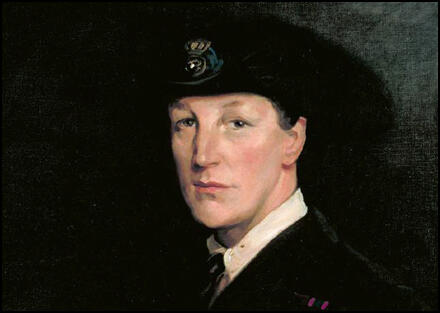On this day on 25th November
On this day in 1609 Henrietta Maria, the youngest child of Henri IV of France, was born. After the assassination of her father in 1610 Henrietta Maria was brought up by her mother, Marie de Medicis.
In 1625 she married Charles I. As she was a Roman Catholic, this marriage was not very popular with the English people. The Puritans were particularly unhappy when they heard that the king had promised that Henrietta Maria would be allowed to practise her religion freely and would have the responsibility for the upbringing of their children until they reached the age of thirteen.
The couple had six children, Charles (1630-1685), Mary (1631-1660), James (1633-1701), Elizabeth (1635-1680), Henry (1640-1660) and Henrietta (1644-1670). Sophia of Bavaria met Henrietta Maria in 1641. She later recalled: "I was surprised to find that the Queen, who looked so fine in the Van Dyck painting, was a small woman... with long skinny arms and teeth like defence works projecting from her mouth."
In 1642 Henrietta Maria fled to Holland where she raised funds for the Royalist army. She wrote to Charles I on 23rd February, 1643: "All day we unloaded our ammunition... The cannon balls whistled over me; and as you can imagine I did not like the music... I went on foot some distance from the village, and got shelter in a ditch. But before I could reach it the balls sang merrily over our heads and a sergeant was killed twenty paces from me. Under this shelter we remained two hours, the bullets flying over us, and sometimes covering us with earth... by land and sea I have been in some danger, but God has preserved me." She returned briefly in 1644 but left for France when it became clear that the Parliamentary army was winning the Civil War.
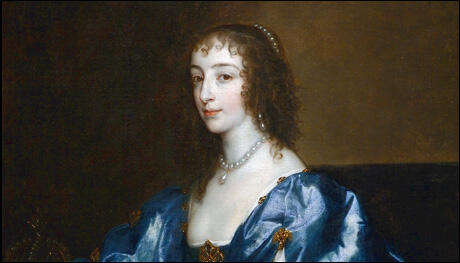
On this day in 1812 Henry Mayhew was born. After being educated at Westminster School, he worked with his father for three years. However, it was a stormy relationship. According to his biographer, Deborah Vlock: "One of seventeen children and the fourth of seven sons, Mayhew failed to live up to his father's expectations; a prominent solicitor and a rigid patriarch, Joshua Mayhew apprenticed each of his sons to the law, and each, except one, eventually pursued other interests. Almost all of them, including Henry, were disinherited as a result (after his father's death, Henry received a legacy of £1 per week). Henry was particularly ill-suited to legal study, and nearly caused Joshua's arrest by neglecting to file some important documents."
In 1831 Mayhew decided to become a writer. For the next eight years worked for the journal, Figaro in London. Mayhew also wrote a well-received play, The Wandering Minstrel (1834). He also co-wrote But However (1838).
In 1841 Mayhew joined with Mark Lemon, a fellow journalist and playwright, to start a a new journal, Punch Magazine. The two men were initially joint-editors and recruited a group of talented writers and illustrators to join the venture, including Douglas Jerrold, Shirley Brooks, Angus Reach, John Leech and Richard Doyle. In the early years the magazine sold about 6,000 copies a week. However, sales of 10,000 were needed to cover the costs of the venture.
In December 1842 it was decided to sell the magazine to Bradbury & Evans. Mark Lemon was reappointed as editor and Henry Mayhew was given the role of "suggester-in-chief". Mayhew wrote his last article for Punch Magazine in February, 1845. Mayhew now launched Iron Times, a railway magazine that lost him so much money that in 1846 he ended up in the Court of Bankruptcy.
The summer of 1849 saw a serious outbreak of cholera. Within three months, an estimated 13,000 people in London died from the disease. On 24th September, Mayhew wrote an article on the impact of cholera on the working-class district of Bermondsey. Soon afterwards Mayhew suggested to the editor, John Douglas Cook, that the newspaper should carry out an investigation into the condition of the labouring classes in England and Wales. Cook agreed and recruited Angus Reach, Charles Mackay and Shirley Brooks to help Mayhew collect the material.
The first article appeared on 18th October 1849. Mayhew concentrated on London and the rest of the team were assigned other parts of England and Wales to investigate. An article appeared every day for the rest of the year and for most of 1850. Mayhew wrote two of these a week and the rest were written by Reach, Brooks, Mackay and some unnamed provincial journalists.
The articles in the Morning Chronicle received a lot of attention. The Economist attacked the publication of such material that it believed was "unthinkingly increasing the enormous funds already profusely destined to charitable purposes, adding to the number of virtual paupers, and encouraging a reliance on public sympathy for help instead on self-exertion."
Douglas Jerrold wrote to a friend in February, 1850: "Do you read the Morning Chronicle? Do you devour those marvellous revelations of the inferno of misery, of wretchedness, that is smouldering under our feet? We live in a mockery of Christianity that, with the thought of its hypocrisy, makes me sick. We know nothing of this terrible life that is about us - us, in our smug respectability. To read of the sufferings of one class, and the avarice, the tyranny, the pocket cannibalism of the other, makes one almost wonder that the world should go on. And when we see the spires of pleasant churches pointing to Heaven, and are told - paying thousands to Bishops for the glad intelligence - that we are Christians!. The cant of this country is enough to poison the atmosphere."
Christian Socialists, such as Charles Kingsley, Thomas Hughes and F. D. Maurice praised Mayhew and the Morning Chronicle. Radicals also approved and newspapers such as the Northern Star and the Red Republican published substantial extracts from these reports. Octavia Hill was one of those who read Mayhew's work and was inspired into action. It is also claimed that the articles influenced the writings of Charles Dickens.
Henry Mayhew's collected articles on poverty were eventually published as London Labour and London Poor (1851). Mayhew's investigation into the plight of the poor revealed the impact that unemployment, starvation and disease was having on the working class. Deborah Vlock has argued: "It remains a seminal study of London street life in the middle of the century, and has been often reprinted. It is required reading for anyone interested in the minutest details of Victorian lower-class life, such as what kinds of foods were sold on the streets, how financial transactions with street-sellers were conducted, and how vendors ‘cried’ their wares."
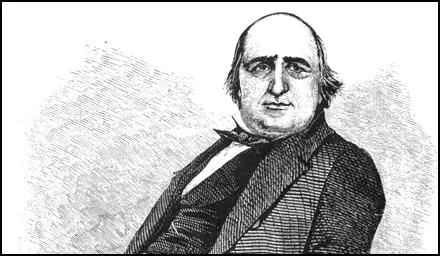
On this day in 1846 Carry Nation was born in Kentucky. Carry Moore, the daughter of a prosperous plantation owner, married Dr. Charles Gloyd in 1867 but left him because of his drinking. After his death she married the lawyer David Nation. Carry Nation ran a small hotel in Columbia, Texas. Later the family moved to Medicine Lodge, Kansas, where David Nation became pastor of the local church.
A supporter of women's suffrage, Nation became an active member of the Women's Christian Temperance Union (WCTU). The main objective of the WCTU was to persuade all states to prohibit the sale of alcoholic beverages.
In 1880 Kansas adopted a constitutional amendment prohibiting the manufacture and sale of intoxicating beverages, except for medicinal purposes. When saloon owners violated the law, Nation went to the bar and used to sing hymns and pray for the souls of the patrons.
On 1st June, 1900 Nation began to take direct action against people violating the law by attacking three illegal saloons in Kiowa. At first she used stones and brickbats but later employed a hatchet to destroy furniture and mirrors in these saloons. At Wichita she attacked a picture of a nude woman in a saloon and as a result was kept in jail for five weeks.
Between 1900 and 1910 Nation was arrested 30 times and spent a great deal of time in prison. Her autobiography, The Use and Need of the Life of Carry A. Nation, helped to publicize her campaign. One New York saloon put up a sign: "All Nations Welcome Except Carry!" Carry Nation died on 9th June, 1911.
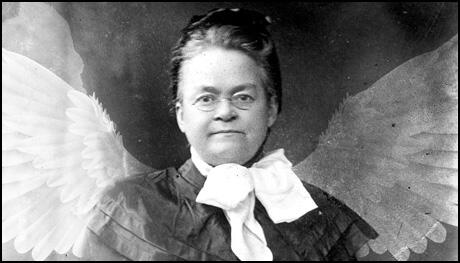
On this day in 1910 Thora Silverthorne, the daughter of George Richard Silverthorne, a miner at the Vivian & Six Bells Pit of Bargoed, was born at Abertillery, Wales.
George Richard Silverthorne was an active member of the South Wales Miners Federation (Miners Union) and a founder member of the Abertillery branch of the Communist Party of Great Britain.
Thora joined the Young Communist League at the time of the 1926 General Strike. During this period she became a close friend of Arthur Horner, a leading figure in the South Wales Miners' Federation.
After the death of her mother, Silverthorne moved to England where she worked as a nanny for Somerville Hastings, who was the member of the House of Commons for Reading. Hastings was also the founder and president of the Socialist Medical Association and he encouraged her to train as a nurse at the Radcliffe Infirmary in Oxford.
Thora Silverthorne remained an active member of the Communist Party of Great Britain and became close friends with fellow member, Christopher Hill. She also worked as a volunteer nurse for the hunger marchers who passed through Oxford. She later recalled that “their feet were often in particularly bad state.”
While living in Reading Silverthorne was active in the local branch of the CPGB. Other members included Harry Jones, William Ball and Reginald Saxton. They had close contact with the town's Labour Party League of Youth, whose members included John Boulting, Roy Poole, Josh Francis and Rosamund Powell.
On the outbreak of the Spanish Civil War it was decided to form a Spanish Medical Aid Committee. In his autobiography, All My Sins Remembered (1964), Peter Spencer, 2nd Viscount Churchill, explained what happened: "A group of us - three well-known medical men, a famous scientist, several trade unionists, and one communist - formed a committee for the purpose of collecting money for medical supplies to be sent to the Spanish Government forces."
Thora Silverthorne decided to volunteer her services to the SMAC. Her friends from the town, John Boulting, Roy Poole,Rosamund Powell and Reginald Saxton followed her example, whereas Josh Francis and William Ball also joined the International Brigades.
The First British Hospital was established by Kenneth Sinclair Loutit at Grañén near Huesca on the Aragon front. Other doctors, nurses and ambulance drivers at the hospital included Archie Cochrane, Penny Phelps, Rosaleen Ross, Aileen Palmer, Peter Spencer, Patience Darton, Annie Murray, Julian Bell, John Boulting, Roy Poole, Richard Rees, Nan Green, Lillian Urmston and Agnes Hodgson.
Archie Cochrane was fairly critical of the original team of doctors and nurses. He claimed things improved after the arrival of Alex Tudor-Hart and Reginald Saxton: "When the mobile team finally arrived in Albacete only four of its original members remained - Kenneth (Sinclair-Loutit), Thora (Silverthorne), Aileen (Palmer), and myself - a situation which I feel reflected the inadequacy of the original selection process. There were, of course, others from subsequent waves of volunteers. I was glad that Reggie Saxton and Keith Anderson were there. Recent arrivals included Dr Tudor Hart, who had some surgical experience, Joan Purser, a nurse, and Max Colin, a mechanic."
Kenneth Sinclair Loutit was also full of praise for her behaviour in Spain: "Thora was outstandingly competent. Her social ease and her care for her neighbour put her above fault... Thora was much braver than I because she was afraid. By some psychosomatic quirk I got used to the risks of war. Thora did not, but she would master her physical reactions and kept her head (thus helping others to do the same), even when the ground shook with bombing - as it did, one night I shall never forget, when we were bivouacked near Aranjuez."
Thora Silverthorne wrote to her family in March 1937: "We have become accustomed to air raids although they still worry me a great deal: I dread them. The planes were over last night, dropped bombs but did no damage. Considering the number of raids surprisingly little damage is done. The swine deliberately attempt to bomb hospitals - it's inhuman. The other day, an English nurse who works in a village some distance from here came along to stay the night with us for a change. She was very shocked. She'd had a nasty experience the day before. She was sitting talking to a comrade when a bomb was dropped quite near them. She was thrown off her chair and her companion was killed. Then she saw a bunch of kiddies killed by another bomb. Its really awful but I can assure you its absolutely true - the nurse told me all about it. Poor dear, she was badly shaken up."
Thora Silverthorne was one of the nurses who joined the the medical unit that was supporting the International Brigades. Over the next few months she served in Aragón. According to Michael Walker: "The International Brigadier, Michael Livesey, died in her - arms a memory she never forgot." Eventually she was "elected" matron at Granen Hospital that had been set-up to treat wounded members of the Thaelmann Battalion.
In November 1937 she wrote to her family about conditions in Spain: "We are very busy - the attack on Huesca has actually begun - and will be for some time I'm afraid. We've been working hard for the last few days and doing very good work. We've been doing major operations and working 14 hour days."
Thora Silverthorne began an affair with Kenneth Sinclair Loutit. "It was of course inevitable that I should fall in love with Thora; all-in-all we behaved responsibly. We were only a few kilometres from an active war front. Our daily work told us that bullets kill, when there are plenty around it alters the perspectives of emotional life. We both worked extremely hard, without leisure for any sweet dalliance... She had a clear bright eye with a wonderful freshness of attention, plus a quality of instinctive understanding of other peoples feelings, which made her social relationships successful. All this encased in Celtic good-looks made me a very privileged man."
On her return to England, Silverthorne became a sub-editor on Nursing Illustrated. In 1937 she helped establish the first union for nurses, the National Association of Nurses. She eventually became General Secretary of the organization.
Silverthorne married Kenneth Sinclair Loutit and the couple lived at 12 Great Ormond Street. He became a doctor in London and in 1938 helped establish Finsbury Health Centre. Unfortunately, the marriage was not a success and ended in divorce and she moved to High Wycombe.
After the Second World War she became Assistant Secretary of the Socialist Medical Association and played an important role in the development of the National Health Service.
In 1946 Thora Silverthorne married Nares Craig, an engineer from Clitheroe, Lancashire and a fellow member of the Communist Party of Great Britain. Thora now became a full time union official for the Civil Service Clerical Association until her retirement in 1970. Thora Silverthorne died on 17th January, 1999.
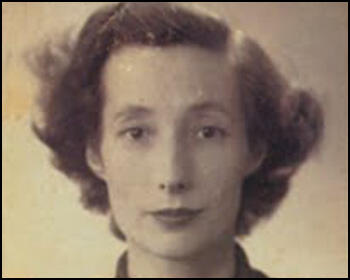
On this day in 1913 Hilda Burkitt and Clara Giveen are arrested for attempting to set fire to the grandstand at the Headingley Football Ground the property of The Leeds Cricket, Football and Athletic Company. The Yorkshire Evening Post reported that Giveen had "escaped from the supervision of the police in Birmingham, to which town she went on Saturday, just before the expiration of her licence."
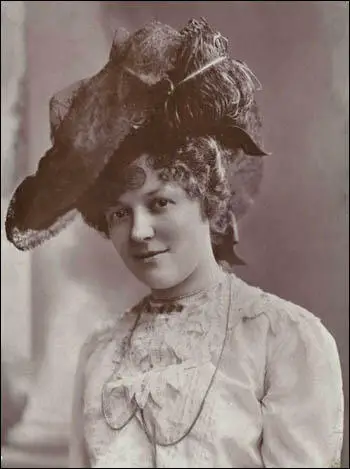
On this day in 1947 the Hollywood Ten are blacklisted. In 1947 Roy M. Brewer was appointed to the Motion Picture Industry Council. At this time the House of Un-American Activities Committee (HUAC), chaired by J. Parnell Thomas, began an investigation into the Hollywood Motion Picture Industry. The HUAC interviewed 41 people who were working in Hollywood. These people attended voluntarily and became known as "friendly witnesses". During their interviews they named nineteen people who they accused of holding left-wing views.
Roy M. Brewer was interviewed by the HUCA in October, 1947. He claimed that he knew 13 writers, actors and directors he said were involved in communist activities. This included John Garfield and Dalton Trumbo, both of whom had volunteered to act as observers for the studio pickets in the Conference of Studio Unions (CSU) strike.
One of those named, Bertolt Brecht, an emigrant playwright, gave evidence and then left for East Germany. Ten others: Herbert Biberman, Lester Cole, Albert Maltz, Adrian Scott, Samuel Ornitz, Dalton Trumbo, Edward Dmytryk, Ring Lardner Jr., John Howard Lawson and Alvah Bessie refused to answer any questions.
Known as the Hollywood Ten, they claimed that the 1st Amendment of the United States Constitution gave them the right to do this. The House of Un-American Activities Committee and the courts during appeals disagreed and all were found guilty of contempt of congress and each was sentenced to between six and twelve months in prison.
Larry Parks was the only actor in the original nineteen people named. He was also the only person on the list who the average moviegoer would have known. Parks agreed to give evidence to the HUAC and admitted that he had joined the Communist Party in 1941 but left it four years later. When asked for the names of fellow members, Parks replied: "I would prefer, if you would allow me, not to mention other people's names. Don't present me with the choice of either being in contempt of this Committee and going to jail or forcing me to really crawl through the mud to be an informer."
The House of Un-American Activities Committee insisted that Parks answered all the questions asked. The HUAC had a private session and two days later it was leaked to the newspapers that Parks had named names.
Leo Townsend, Isobel Lennart, Roy Huggins, Richard Collins, Lee J. Cobb, Budd Schulberg and Elia Kazan, afraid they would go to prison, were willing to name people who had been members of left-wing groups. If these people refused to name names, they were added to a blacklist that had been drawn up by the Hollywood film studios.
In June, 1950, three former FBI agents and a right-wing television producer, Vincent Harnett, published Red Channels, a pamphlet listing the names of 151 writers, directors and performers who they claimed had been members of subversive organisations before the Second World War but had not so far been blacklisted. The names had been compiled from FBI files and a detailed analysis of the Daily Worker, a newspaper published by the American Communist Party.
A free copy of Red Channels was sent to those involved in employing people in the entertainment industry. All those people named in the pamphlet were blacklisted until they appeared in front of the House of Un-American Activities Committee (HUAC) and convinced its members they had completely renounced their radical past.
Edward Dmytryk, one of the original Hollywood Ten, had financial problems as a result of divorcing his first wife. Faced with having to sell his plane and encouraged by his new wife, Dmytryk decided to try to get his name removed from the blacklist. On 25th April, 1951, Dmytryk appeared before the House of Un-American Activities Committee again. This time he answered all their questions including the naming of twenty-six former members of left-wing groups.
Dmytryk also revealed how people such as John Howard Lawson, Adrian Scott and Albert Maltz had put him under pressure to make sure his films expressed the views of the Communist Party. This was particularly damaging to those members of the original Hollywood Ten were at that time involved in court cases with their previous employers. If these people refused to name names, they were added to a blacklist that had been drawn up by the Hollywood film studios.
Over 320 people were placed on this list that stopped them from working in the entertainment industry. This included the following: Larry Adler, Stella Adler, Leonard Bernstein, Marc Blitzstein, Joseph Bromberg, Alan Campbell, Charlie Chaplin, Aaron Copland, Hanns Eisler, Edwin Rolfe, Carl Foreman, John Garfield, Howard Da Silva, Dashiell Hammett, E. Y. Harburg, Lillian Hellman, Burl Ives, Arthur Miller, Dorothy Parker, Philip Loeb, Joseph Losey, Dorothy Parker, Anne Revere, Pete Seeger, Gale Sondergaard, Louis Untermeyer, Josh White, Zero Mostel, Clifford Odets, Michael Wilson, Paul Jarrico, Jeff Corey, John Randolph, Canada Lee, Orson Welles, Paul Green, Sidney Kingsley, Paul Robeson, Richard Wright and Abraham Polonsky.
Some blacklisted screenwriters continued to write under assumed names. Two of these writers, Dalton Trumbo, Roman Holiday (1953) and The Brave One (1956) and Michael Wilson, Bridge Over the River Kwai (1957), won Academy Awards for their screenplays.
In 1960 Dalton Trumbo became the first blacklisted writer to use his own name when he wrote the screenplay for film Spartacus. Based on the novel by another left-wing blacklisted writer, Howard Fast, the film that examines the spirit of revolt. Trumbo refers back to his experiences of the House of Un-American Activities Committee. At the end, when the Romans finally defeat the rebellion, the captured slaves refuse to identify Spartacus. As a result, all are crucified. Ironically, much of Spartacus was filmed on land owned by William Randolph Hearst. It was Hearst's newspapers that played such an important role in making McCarthyism possible.
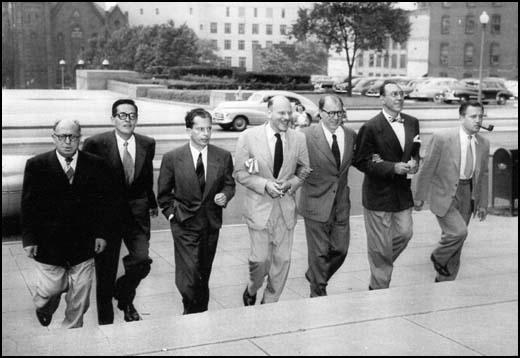
Lester Cole, Herbert Biberman and Edward Dmytryk
On this day in 1952 Katharine Furse died in London. Katharine Symonds, the daughter of the historian, John Addington Symonds and Janet Catherine, was born on 23rd November 1875. Educated by governesses and her mother she spent most of her early life in Switzerland and Italy.
Katharine had intended to train as a hospital nurse but after meeting the artist, Charles Wellington Furse, she changed her plans. The couple were married in 1900 but Furse died four years later leaving her with two young children.
In 1909 Katharine Furse joined the Red Cross Voluntary Aid Detachment that was attached to the Territorial Army. On the outbreak of the First World War Furse was chosen to head the first Voluntary Aid Detachment unit to be sent to France. Aware of her administrative abilities, the authorities decided to place Furse in charge of the VAD Department in London. By 1916 she was appointed Commander-in-Chief and the following year became one of the five women appointed Dame Grand Cross, a newly created Order of the British Empire.
Although considered a great success as head of the Voluntary Aid Detachment, Furse was unhappy about her lack of power to introduce reforms. In November 1917, Furse and several of her senior colleagues resigned. Furse was immediately offered the post as Director of the Women's Royal Naval Service (WRNS).
The Royal Navy was the first of the armed forces to recruit women and since 1916 the Women's Royal Naval Service took over the role of cooks, clerks, wireless telegraphists, code experts and electricians. The women were so successful that other organizations such as the Women's Army Auxiliary Corps (WAAC) and the Women's Royal Air Force were also established.
After the war Furse joined the travel agency of Sir Henry Lunn. Working mainly in Switzerland, Furse became an expert skier and did a great deal to popularize the sport with British tourists. He achievements were acknowledged when she became President of the Ladies' Ski Club.
In 1920 Katharine Furse formed the Association of Wrens and this led to her becoming head of the Sea Rangers and for ten years was director of the World Association of Girl Guides and Girl Scouts. Her autobiography, Hearts and Pomegranates was published in 1940.
